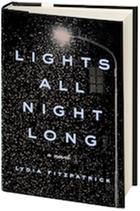
Lydia Fitzpatrick's remarkable debut novel is a coming-of-age narrative interwoven with a gripping mystery. Lights All Night Long follows 15-year-old Ilya as he achieves his long-held dream by arriving in America as an exchange student. What should be the culmination of years of hope and effort is overshadowed for Ilya, however, by recent events in his tiny Russian hometown. The narrative moves back and forth in time, between Ilya's awkward introduction to his host family in Louisiana and his childhood in Russia. As Ilya adapts to life in America, we gradually learn the source of the deep worries and regret that haunt him: back in Russia, his brother, Vladimir, has been imprisoned for a series of gruesome murders that Ilya is sure he did not commit.
Ilya's childhood in Russia is dominated by his relationship to his older brother. Vladimir is a complicated character, a charismatic troublemaker who encourages Ilya's budding English-language skills while resenting the attention and favored status that they earn his younger brother. Fitzpatrick skillfully re-creates the sense of hopelessness that fell over many towns after the dissolution of the Soviet Union and the rise of the oligarchs. The mood is so bleak that some older residents claim nostalgia for Communism despite the nearby mass graves. In this atmosphere, Vladimir comes into conflict with his family and gradually sinks into delinquency and drug addiction. Fitzpatrick heartbreakingly portrays Vladimir's descent through Ilya's eyes. Ilya is forced into a timeless, terrible role: watching a loved one slip away, helpless to save them.
In Louisiana, Ilya is welcomed by his relentlessly cheerful host family, the Masons. He finds himself overwhelmed by the consumerist abundance of America, fascinated yet repelled by how much Americans take for granted, their casual wastefulness. Fitzpatrick uses Ilya to present an outsider's view of American culture. Through his eyes, American life is saturated in wealth and excess. Even American religion seems super-sized: "Pastor Kyle's sermon was a mishmash of sound bites. He seemed more concerned with volume than with content. His voice was a power hose, blasting the congregation's brains."
Ilya is eventually drawn out of his shell by Sadie, the Masons' beautiful daughter, who has secrets of her own. Through Sadie, Ilya learns that he isn't the only one who feels out of place because of a traumatic past. Fitzpatrick shows herself just as capable at portraying the insecurities and false starts of teenage romance as she is at crafting an engrossing mystery.
The central mystery of the book is how Vladimir came to be blamed for the murders, and Fitzpatrick approaches it from multiple angles. In the present, Ilya digs into social media profiles and embarks on cross-country trips to prove Vladimir's innocence. In the past, we learn how Vladimir became increasingly alienated from Ilya and his family. Ilya sifts through his memories for clues, including tortured ones of the time Ilya spent with one of the young women not long before she was killed. The investigation into Vladimir's culpability doubles as an investigation into the breakdown of Ilya's relationship with his brother. Ilya is haunted by guilt, by the thought that he could have done more to keep his brother safe and close. Fitzpatrick leaves the question unnervingly open, forcing the reader to wonder whether anything might have altered Vladimir's trajectory.
One of the book's great pleasures is that, for all the pain of his past weighing Ilya down, he's forced to proceed with the ordinary business of being a teenager. Ilya's burgeoning crush on Sadie is as exciting as any 15-year-old's first love, while navigating high school is even more complicated given the cultural barriers. Ilya has to field ignorant questions and stereotyped assumptions about his life in Russia from teens and adults alike. He has to learn to let down his guard and trust people. And, with Sadie, he recognizes a kindred spirit: "...he realized why her room looked the way it did. Uninhabited. Like there was a suitcase just out of sight. Like she was ready for flight." In a deeply foreign place, Ilya eventually finds belonging.
Before Ilya leaves for America, Babushka tells him that she's glad his grandfather, who was in the gulag for seven years, is no longer with them. When Ilya asks why, she responds: "Because he wouldn't have let you go. America. Not in a million years. You suffer for a country, and you either find a way to love it or you go nuts." In some ways, this is analogous to the relationships between many of Fitzpatrick's characters, especially the one between Ilya and Vladimir. Vladimir is far from a model older brother. He's bitter, angry and heavy with poor decisions. And yet, his love for Ilya is fierce. For Ilya, part of unwrapping the mystery around Vladimir's imprisonment is discovering just how deep Vladimir's commitment to him remained even during his brother's darkest hours. Fitzpatrick shows that relationships can be as obscure and twisted as any murder mystery. Lights All Night Long is about the people you love despite everything, because you have to or you'll go nuts. --Hank Stephenson

